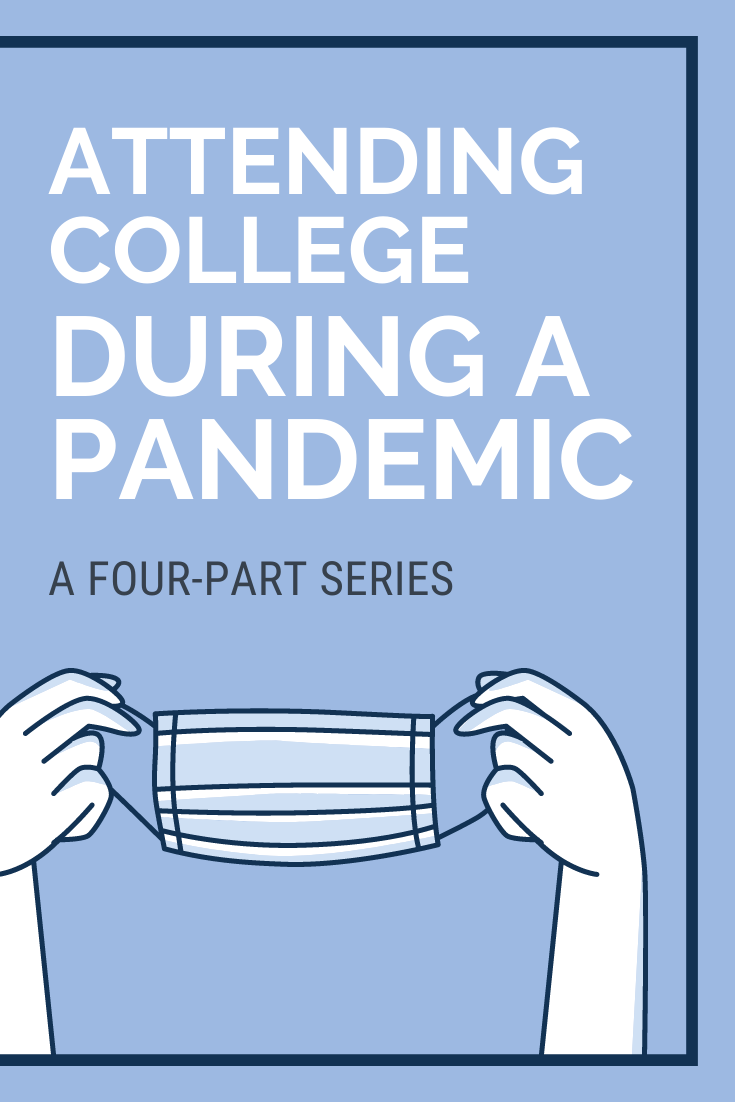I Haven't Found My People In College: How to Make Friends During COVID-19
“Social relationships aren’t just for fun or entertainment. They are very important,” states Mitch Prinstein, a professor of psychology and neuroscience and an expert on adolescent peer relationships.
During a normal first semester of college, making friends is tough. During a pandemic, this process seems impossible.
Finding your tribe during a regular first semester includes many challenges. The process of friend-making takes time, patience, and persistence. Many students struggle to build community during their first year of college.
Starting college during a pandemic provides even more challenges to this friend-making process. Wearing face masks and maintaining social distancing cancels out the possibility of normal social gatherings with large groups, but freshmen can do five things to find their people in college.
Be on your phone less.
When you go from class to class, how do you spend your time? If your classes are close together, you likely walk. The awkwardness of this commute (whether by foot or by public transportation) may encourage you to take out your phone.
Even if you’ve scrolled through your feed many times already today, you’d rather be on your phone than awkwardly sitting and staring around in silence. Though this situation is uncomfortable, being on your phone causes you to miss important opportunities to meet people.
Meeting new people is skill, and you may feel like it’s a skill you’ll never master. Without a doubt, you won’t improve without practice. When you next find yourself in an uncomfortable situation (like the one described above), consider making an alternative choice.
For example, when you sit in your seat only minutes before class starts, instead of pulling out your phone…
Talk to the person next to you. Say “good morning” or “good afternoon” (whatever is appropriate).
Ask a common question like “How’s your day going so far?” or comment on something that demonstrates you have common ground like “I’m never sure if I’m quite ready for these quizzes.”
Though the person sitting next to you in class is unlikely to become your closest friend, they are likely to become more than a stranger. Even if you never see this person after this semester, you’ll get to practice meeting people and making friends.
In the days of a pandemic, being distant and unfriendly is easier. Being friendly and initiating a conversation requires work and intentional effort. You will always be able to convince yourself that today isn’t the right day or that there’s something else more important that needs your attention.
Refuse to glue your eyes to your phone screen and practice meeting people around you. You may be surprised what friendships you develop.
Move virtual communication to in-person communication.
Meeting friends via social media likely feels like much less work. While social media may help you initially connect with people, maintaining and building on that connection is far more difficult if your communication stays virtual.
In the past, turning virtual connections into real relationships may not have seemed that important, but you learned while quarantined just how shallow virtual connections can be. You need real friendships and actual connections with people who genuinely care about you.
If you desire meaningful friendships and connection, work to move virtual friendships to in-person friendships. This may mean messaging another student in your dorm and asking them if they want to grab a meal with you. This may mean forming a study group with other freshmen in the same class.
Whatever you need to do to turn Instagram friends into actual friends, work to move to the next step. Exchange phone numbers, ask for an email address, make plans—take that first step to build community in person.
State your feelings and expressions.
You can’t see through your mask, and only your eyes are left visible. While some may claim eyes are the window to your soul, your eyes communicate only a small portion of what you’re really thinking or feeling. As a result, you can often find your in-person interactions feeling incredibly awkward.
Rather than viewing this discomfort as being a sign you lack ability or should give up, consider the awkwardness a sign that you need to make more of an effort.
Because people can hear little of what you say muffled under a mask, speak a little louder.
Because people can see little of what your face expresses under a mask, you may need to simply state what you’re feeling.
As odd as it feels, simply stating your feelings can help to make awkward situations less awkward.
Rather than sitting in silence because of fatigue, actually state to the person next to you, “Well I feel exhausted” or “I’m just counting down the minutes until I can take a nap.”
Rather than sitting in silence because of feeling lost in class, raise your hand and tell the teacher, “I think I’m slightly confused. Could you rephrase the question?”
Your classmates, peers, and teachers may have no clue what you’re thinking. They may even be jumping to conclusions that you’re upset, boring, or uninterested. Stating what you’re thinking and feeling helps you to make a good impression on others.
Aim for meaningful conversations.
Face-masked or not, having a meaningful conversation takes work. Unless the person is uncommonly insightful or a close friend, you can’t immediately jump into deep and insightful conversations. So how do you get there?
Find common ground. If you want to establish a real connection with a person, you need to find something you have in common. Maybe you both had a similar experience: living in the same dorm, growing up in a certain area of the country, etc. Take advantage of what you have in common.
Ease your way in. You’ll likely have to carefully ease your way into these conversations. Once you’ve discovered some commonalities, you can slowly move into a more substantive conversation. Questions are a great way to dig deeper into a conversation that started on the surface-level. Ask them for their opinions or preferences, their likes and dislikes, etc. Most people love sharing their point of view.
Keep trying. You’re not likely to “hit the ball out of the park” on the first try to dig deeper. You may say some awkward things or even act a little awkward. Sometimes people don’t really want to dig deeper and will make that very obvious by ignoring you or barely answering questions. Simply move on to another person and try to build a meaningful connection with them.
Embrace the challenges.
Attending college during a pandemic isn’t for the faint of heart. It’s exhausting. It’s sometimes demoralizing. It’s downright difficult. Your grades may be lower than you’d like. You may not have the opportunities you waited for during high school. And you’re not the only student who feels this way.
You may be tempted to lean to extremes: faking you’re ok or wallowing in misery. Some days will be better than others. You don’t need to pretend college life is better than it is, but you also don’t need to rehearse how difficult your college experience is over and over in your head.
If you want to make friends this year, be genuine. That doesn’t mean pretending to be more positive or negative than you are. Being genuine means being the best version of you possible during this challenging year.
When you’re truly “yourself” (whoever that is right now), that’s when people enjoy being with you most. Embrace the challenges. Be genuine. This year is only a stop on the journey to becoming who you’d like to be.
You can make college friends during a pandemic. You can build community and find belonging. However, this process will take time and effort, but you will eventually find your people. The challenges of making friends during a pandemic will only work to make your friendships stronger.
Read the other posts in the “Attending College During a Pandemic” Series!
Part 2 of this series— 9 Tips for Communicating While Wearing a Face Mask in the Classroom by Katie Azevedo from SchoolHabits
Part 3 of this series — 8 Healthy Ways to Cope With Mask-Wearing and Improve Your Mental Health by Jessica Smith from The Peaceful Professor
Part 4 of this series — 3 Ways COVID-19 Is Getting You Ready for College and Career by Katy Oliveira from Collegehood Advice











